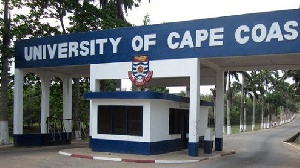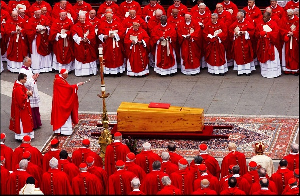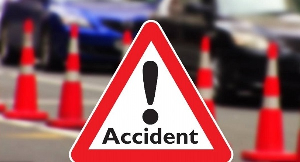The university of Cape Coast, known for its stringent academic style, is currently battling with the maintenance of its high-earned reputation on the academic ladder.
Whenever universities are ranked globally, we expect to see Ghanaian universities riding on top. But how can this be when research – which is a strong determinant of the ranking system of the universities – is neglected? How can Ghanaian universities compete with the others when they produce half-baked graduates, some of whom become liabilities to the Ghanaian society?
The question is, “Na who cause am?”. Are the lecturers in the universities to blame for the rendering of inefficient and ineffective services; or a big agency somewhere is fuelling this mess with its annoying negligence of duty?
A higher lecturer to student ratio is among the factors that promote teaching, research and learning in all tertiary institutions. Unfortunately, the embargo on employment has decreased the lecturer to student ratio at the University of Cape Coast.
Several vacancies are available in the various departments at UCC, but the icy hand of the employment embargo has made it difficult for those vacancies to be filled.
On February this year, the Deputy Minister of Education in charge of tertiary institutions – Hon Okudjeto Ablakwa – stated clearly that there is no more embargo on the education and the health sector.
This statement brightened the countenances of potential lecturers who had tended in their applications at various departments within the University of Cape Coast. However, when they contacted the institution to find out whether they would soon be called for interview, their anticipated glory was truncated with a sharp reply that the embargo is unabated.
Some of these qualified lecturers are still at home, while others have taken on voluntary services in some departments.
Due to the shortage of lecturers, the following challenges are on the rise at UCC; 1. Some lecturers are forced to read and teach other courses which they are not qualified to teach.
2. It has become common to find a single lecturer who supervises Undergraduate theses, supervises Master’s degree theses, supervises Doctor of Philosophy theses, serves as external examiner to other institutions, and still provides counselling to students.
3. Lecturers teach thousands of students. Due to this, they cannot mark the assignments and examinations they give them, and so allow the teaching assistants to handle such matters.
4. Some teaching and research assistants have been given courses to handle, and as to whether they teach those courses very well, only the students can tell.
These and a lot more are happening at UCC, and the overall effect is that the lecturers cannot have ample time to fully prepare and teach the students well, conduct research, give regular assignments to students and hold counselling sessions for the students.
Think about the calibre of students that will come out of this institution? If this situation is allowed to persist, then the future of UCC looks bleak. Yet we have the communicators of the NDC filling the airwaves with the information that there is no more embargo on employment in the education sector.
I will not say that they are lying, but I would like to use this platform to remind them that UCC is hungry for lecturers. I know a department that has as few as three lecturers; and how those lecturers are struggling to perform their duties, should be observed and not told.
If the embargo has truly been lifted, why is the government still disallowing UCC from appointing lecturers? Is there something they are not telling us? I am very certain that other tertiary institutions are floundering in this same mud of confusion.
If the government closes his eyes at this issue at stake, and thinks that provision of roads alone in the Cape Coast Metropolis is enough to warrant him our support, then he must know that a massive inciting of the students and workers of UCC to vote against the NDC is being launched by some people. A stitch in time saves nine, Mr. President.
Opinions of Friday, 8 July 2016
Columnist: E. A. Adu Gyamfi
The standard of education at UCC is gradually falling
Opinions














